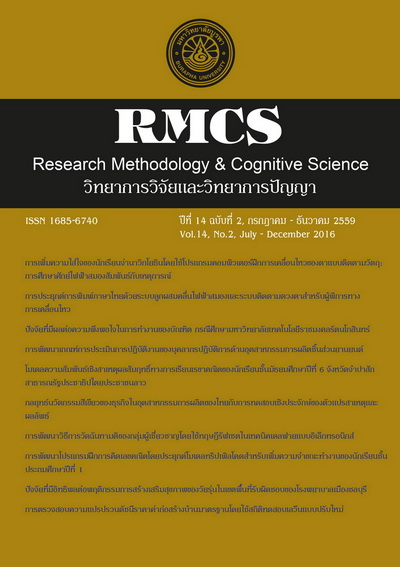ปัจจัยที่มีผลต่อความพึงพอใจในการทำงานของบัณฑิต กรณีศึกษามหาวิทยาลัยเทคโนโลยีราชมงคลรัตนโกสินทร์
Main Article Content
Abstract
การศึกษานี้มีวัตถุประสงค์เพื่อวิเคราะห์ปัจจัยที่มีผลต่อความพึงพอใจในการทำงาน ใช้แนวคิดทฤษฎีทุนมนุษย์
(Human capital theory) โดยใช้ข้อมูลปฐมภูมิจากแบบสอบถามจากบัณฑิตที่สำเร็จการศึกษาตั้งแต่ปี พ.ศ. 2553-2556 จำนวน 476 คน และวิเคราะห์ตามแบบจำลองโลจิสติคพหุกลุ่ม (Multinomial logistic model) โดยใช้สถิติ
วิเคราะห์องค์ประกอบเชิงสำรวจ (Exploratory factor analysis) และสถิติเชิงบรรยาย ปรากฏว่า บัณฑิตที่สำเร็จ
การศึกษาตั้งแต่ปี พ.ศ. 2553-2556 มีความพึงพอใจในงานที่ตนทำอยู่คิดเป็นร้อยละ 80 ซึ่งปัจจัยสำคัญที่สุดที่มีผล
ต่อความพึงพอใจในการทำงานของบัณฑิต คือ ทักษะการทำงาน รองลงมา คือ กระบวนการเรียนการสอน นอกจากนี้
องค์ประกอบของกระบวนการเรียนการสอนที่เพิ่มขึ้น 1 เท่า จะเพิ่มโอกาสที่บัณฑิตจะพึงพอใจในงานที่ตนทำประมาณ
1.68 เท่า เมื่อเปรียบเทียบกับบัณฑิตกลุ่มที่ไม่พึงพอใจในงานที่ตนทำ ดังนั้นผลการประเมินและติดตามบัณฑิตเป็นที่น่า
พอใจมากและผ่านเกณฑ์ตัวชี้วัดเชิงปริมาณและเชิงคุณภาพ แต่ควรปรับปรุงหลักสูตรให้ทันสมัยเน้นทักษะการทำงาน
อีกทั้งให้สอดคล้องกับวิสัยทัศน์ของมหาวิทยาลัยในการคาดหวังให้บัณฑิตสำเร็จการศึกษาเป็นผู้ประกอบการในอนาคต
The purposes of this study were to analyze the graduates’ job satisfaction based on Human
Capital and Career Development Theories. Primary data for the graduate survey were collected from 476 graduates between A.D.2010–2013. The statistical analyses employed in this study were Descriptive, Multinomial Logistic Model and Exploratory Factor Analysis. The results showed that 80% of them were satisfied with their jobs and the most important factors affecting the graduates’ job satisfaction were teaching process. A double of learning and teaching components led to 1.68% increasing opportunity of graduates’ job satisfaction when compared to those with job dissatisfaction. Therefore, the curriculum should be revised and focused more on basic work skills of the undergraduate majors. Furthermore, it should be applicable to entrepreneurial opportunities consistent with the university’s identity.
Article Details
References
Clark, A. E., & Oswald, A, J. (1994). Unhappiness and unemployment. Economic Journal, 104(4), 341-372.
Cochran, W. G. (1953). Sampling Techniques. New York: John Wiley & Sons.
Diem. P. T., & Ha. N. M. (2013). Analyzing the employment status of graduate students: The case of Kent International College in Vietnam. Advances in Management & Applied Economics, 3(4), 235-248.
Kane, T. J. (2004). College-going and inequality. In K. M. Neckerman (Ed.), Social inequality. New York: Sage, 319-353.
Sutherland J. (2012). Employment status and job satisfaction. Evidence-base HRM: a Global Forum for Empirical Scholarship, 1, 187-216.

